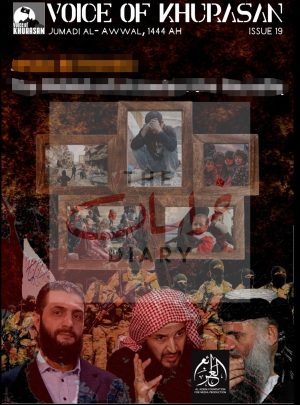Publicity is the bloodline of terrorist groups, as terrorism by definition is propaganda by deed. Terrorist groups do not engage in violence for the sake of violence. Rather, they practice it to highlight their political or ethnic grievances, draw attention to their causes and demands, or promote their ideological worldviews.
The advent of social media has further enhanced the importance of propaganda for terrorist groups. These days, social media wings are the most important part of any terrorist group’s organizational structure. Social media wings of terror groups are responsible for broadcasting their respective organizations’ viewpoints, serve as a means of communication with the outer world, and hunt for new potential recruits and donors.
No terror group has honed the art of using social media to stay relevant and promote its jihadist agenda as well as the Islamic State (IS). Following its military defeat and territorial losses in Iraq and Syria in 2018, IS prioritized propaganda by replacing the centrality of territory with terrorist attacks and social media propaganda. IS accords propagandists the same weight it gives to its fighters. Since 2018, IS has managed to stay afloat by keeping its brand of transnational militancy alive through robust social media propaganda and its worldwide network of branches (the so-called provinces or wilayat).
Of all IS branches, Islamic State Khorasan Province (ISKP) has shown the capability to produce multilingual propaganda matching that of the parent group. Though ISKP is Afghanistan-Pakistan-centric, it is also involved in IS’s global propaganda operations and has markedly increased the international scope of these operations in recent years. Al-Azaim Foundation for Media Productions and Communications, ISKP’s main propaganda arm, is transnational down to its very DNA.
Since the Taliban’s takeover of Afghanistan in August 2021, ISKP has pushed toward delegitimizing their regime and undermining their claim of restoring peace. ISKP attaches great significance to the power of propaganda on social media platforms, maintaining, “Our pens are daggers in the hearts of kuffar.” Al-Azaim Foundation produces propaganda in as many languages on social media as IS did during its peak period, and then its supporters and followers amplify it.
In the post-territorial phase of its lifecycle, IS strives to control and dominate the media discourse. In other words, it tries to use media against media. ISKP’s ideologues Abu Saad al-Khorasani and Sultan Aziz Azzam (who has been missing in action for the past year) are its two main propagandists.
ISKP’s social media propaganda network is very robust and spread across the social media spectrum. As mentioned, Al-Azaim Foundation for Media Productions and Communication is ISKP’s main propaganda arm, which mainly produces books and occasionally publishes videos. Its other propaganda units include:
- Al-Millat Media (publishes booklets and statements from ISKP’s central leadership)
- Khalid Media (video production)
- Al-Akhbar Wilayah Khorasan (more mundane statements and day-to-day developments)
- Haqeeqat News (same as above)
- Tor Barighona
- Al-Mursalat Media
ISKP produces propaganda in many languages: Pashto, Dari, Persian, Urdu, Uzbek, Tajik, Hindi, Malayalam, Russian, Arabic, English, and occasionally in Uyghur. The main themes of its propaganda are aimed at undermining the Taliban’s ideological legitimacy while bolstering IS claims to its self-styled global Sunni caliphate. ISKP carefully watches concessions that the Taliban regime makes to gain the international community’s support with regard to the provision of humanitarian aid, and expands its list of criticism targeting the West accordingly.
ISKP propaganda also targets China for oppressing Uyghur Muslims in Xinjiang, increasing cooperation with the Taliban regime, and its growing “imperialism” through the Belt and Road Initiative (BRI). Similarly, ISKP also targets the West for its military campaign against the group in the Middle East and Afghanistan. It routinely targets Pakistan as well for aiding the Taliban’s return to power in Afghanistan as well as religious minorities, particularly Shia Muslims and Sufis as well as the Sikh community both in Afghanistan and Pakistan.
ISKP also directs its propaganda at madrassa and school/college students for recruitment.
Its propaganda products range from books to videos, audio statements to infographics, magazines to credit claims for its attacks and occasional booklets on more pressing issues. ISKP’s Al-Azaim Foundation also publishes two monthly magazines Khorasan Ghag and the Voice of Khorasan, in Pashto and English languages, respectively.
Of the several books that the group has published, the three that stood out in 2021 are “The Truth of the Taliban Movement,” “Recitation of Surah Al-Fatiha During the Prayer,” and “Oh Propagandist! Do You Know Your Value of Jihad?”
The ISKP’s robust propaganda strategy underscores the fact that military means alone will not be sufficient to overcome the ideological challenge it poses in the Afghanistan-Pakistan region. Instead, robust counternarratives to debunking the group’s ideological claims with effective social media components will be crucial. The battle of ideas and narratives can only be won through better ideas and narratives, not bullets.

































